The Complete Carpenter: Big Trouble in Little China (1986)
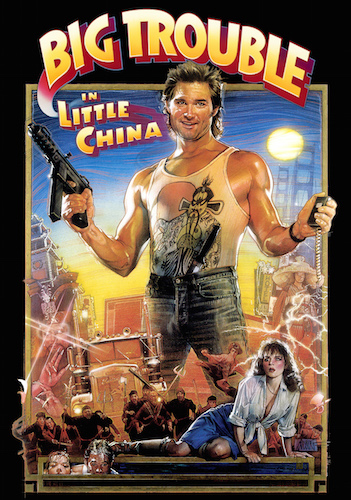 John Carpenter has seen plenty of his films underperform when first released, only to turn into cult icons years later. But Big Trouble in Little China, Carpenter’s ninth feature film, didn’t just underperform. It was the biggest flop of his career up to that point, pulling in $1.1 million against a budget of $25 million. This ended Carpenter’s phase with the big studios and sent him back to the indie world.
John Carpenter has seen plenty of his films underperform when first released, only to turn into cult icons years later. But Big Trouble in Little China, Carpenter’s ninth feature film, didn’t just underperform. It was the biggest flop of his career up to that point, pulling in $1.1 million against a budget of $25 million. This ended Carpenter’s phase with the big studios and sent him back to the indie world.
Big Trouble in Little China started on the page as a Western set in 1899. It was rewritten for a modern-day setting by script-doctor (and Buckaroo Banzai director) W. D. Richter before Carpenter arrived. Carpenter sparkled up the screenplay with his love of screwball comedy characters and dialogue and took inspiration from Chinese martial arts fantasy movies like Tsui Hark’s Zu Warriors of the Magic Mountain. Out of this stew, Carpenter created what he called “an action adventure comedy Kung-Fu ghost story monster movie.” Something for everybody. Kurt Russell promised audiences in a promotional featurette that they’d definitely get their five-bucks’ worth.
But the final product baffled the executives at 20th Century Fox. The studio dumped the promotional marketing into the sewer, contributing to the movie’s massive box-office crash. But, according to the Law of John Carpenter Cult Movies, Big Trouble in Little China gained a second life on cable and video. By the mid-‘90s, when the Hong Kong martial arts fantasy/comedy genre blew up in North America, this ode to Kung Fu, movie serials, Chuck Jones, and clueless macho heroes had become a classic.
The Story
Jack Burton (Kurt Russell) is the tough-talking, hoagie-munching truck driver of the Pork Chop Express. He arrives in San Francisco and meets his buddy Wang Chi (Dennis Dun) for beer and pai gow. Jack drives Wang to the airport to pick up his friend’s fiancée, Miao Yin (Suzee Pai), who’s arriving from Beijing. But at the airport, a Chinatown street gang kidnaps Miao Yin to sell to a brothel. When Jack and Wang pull into Chinatown to search for her, they land in the middle of a war between the ancient societies the Chang Sing and Wing Kong — as well as an eruption of strange magic that leaves Jack Burton confused for … well, pretty much the rest of the movie.
Miao Yin’s kidnapping has a more sinister goal than sex-trafficking: a two-thousand-year-old wizard, Lo Pan (James Hong), plans to make the emerald-eyed girl his bride to lift an ancient curse that has made him incorporeal. Wang gets the help of the Chang Sing and a local mystic, Egg Shen (Victor Wong), to travel into the Chinatown underworld and rescue Miao Yin before Lo Pan completes the marriage ceremony. Tagging along is a crusading lawyer, Gracie Law (Kim Cattrall), and an eager reporter, Margo (Kate Burton). Jack’s there too, because somebody stole his truck and he wants it back. The heroes face monsters, death traps, and a trio of magical entities called the “The Three Storms” who hurl lightning. Will Wang rescue his finacée? Can Lo Pan be stopped? Well, don’t worry, everybody can relax … Jack Burton’s here. And you know what Jack Burton always says at a time like this: “What the hell.”
The Positives
An audience watching Big Trouble in Little China in 2018 might wonder how it fizzled in theaters. It’s a perfect action-comedy-fantasy confection with creative martial arts fight scenes, colorful visual effects, and a big wok bowl full of zippy characters. I’d argue it’s the purest fun of anything John Carpenter has directed. It’s aware that it’s a pulpy cartoon and makes no apologies as it smashes ahead like the Pork Chop Express. Plus, it has Kurt Russell starring as a riotous spoof of 1980s tough-guys. Who doesn’t love Kurt Russell and some good ol’ genre subversion?
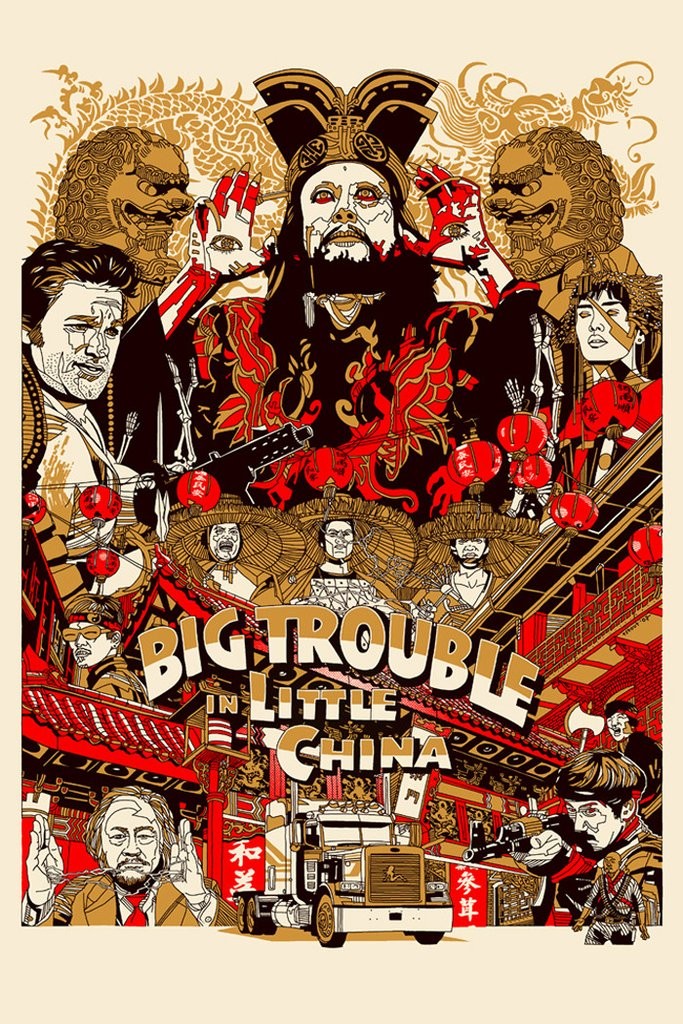 Well, apparently audiences in 1986. (Although thanks to Fox’s invisible marketing, most people didn’t even know the movie was out.) One of the film’s biggest assets — the premise of the hero who’s actually the klutzy sidekick and doesn’t know it — ended up a liability in the mid-‘80s. Viewers expected a lead who was a Sylvester Stallone or a Harrison Ford type. Instead they got … Jack Burton. Basically John Wayne if the screenwriter forgot he was the hero.
Well, apparently audiences in 1986. (Although thanks to Fox’s invisible marketing, most people didn’t even know the movie was out.) One of the film’s biggest assets — the premise of the hero who’s actually the klutzy sidekick and doesn’t know it — ended up a liability in the mid-‘80s. Viewers expected a lead who was a Sylvester Stallone or a Harrison Ford type. Instead they got … Jack Burton. Basically John Wayne if the screenwriter forgot he was the hero.
But that’s the joke! And it’s a hilarious one that never stops being funny. Jack Burton, like Kurt Russell’s other Carpenter movie icon, Snake Plissken in Escape from New York, is a parody of an action archetype. Snake Plissken was written and performed as an exaggeration of the laconic anti-hero of the 1970s. Jack Burton is an undermining of the 1980s macho loose cannon. Snake is silent, competent, objective, and smooth. Jack is loud, oafish, impulsive, and clumsy. Snake knows he’s the hero and doesn’t care. Jack Burton thinks he’s the hero when he’s really the comic relief.
It’s a superb gag and one of the reasons Big Trouble in Little China holds up as an action-comedy. Jack Burton is the reverse of Carpenter’s usual protagonists who have a greater awareness of their world than the people around them. Jack seems to know less the longer the movie goes on. A huge chunk of his dialogue is shouting questions about what’s going on: “What alley?” “What is it, a parade?” “Where in the hell are we?” “Who the hell are you?” and those three Jack Burton classics, “What?” “Who?” and “Where’s my truck?” Seventy-five percent of the time that Jack tries a hero move, he slips and ends up on his ass or punched in the face. He charges into a firefight with his gun’s safety still on. He enters the climactic confrontation with Lo Pan boisterously unloading his gun into the ceiling — and knocking himself unconscious from falling masonry, Wile E. Coyote-style. Lo Pan succinctly evaluates Jack Burton when he tells him, “Shut up, Mr. Burton! You are not brought upon this world to ‘get it’!”
The broader lampoon is that the swaggering white guy dominating the Drew Struzan poster, striking a pose in a wife-beater T-shirt and hefting a submachine gun, doesn’t get to be the caucasian savior in a movie with a mostly Asian cast. Dennis Dun’s supposed sidekick, Wang Chi, is the real hero who does most of the work and has the biggest stake in the outcome. Carpenter and Co. were ahead of their time in shifting the hero roles to the non-caucasian characters and satirizing the reign of the generic white guy.
Kurt Russell goes all-in on playing Jack Burton, taking an ego-free approach to making himself look like a doofus in every scene. The joke would crumble without an actor who has both comedy chops and leading man charisma. Russell and his John Wayne-drawl are perfect, and his chemistry with the rest of the cast is wonderful to watch. He pairs great with Dennis Dun. The Wang Chi role was originally intended for Jackie Chan, and although I’d love to see what that movie would’ve been, I can’t argue with how Dun plays the plucky hero and the natural way he bounces off Russell. You can’t beat the snap between the two on an exchange like this, when Jack sees Chinese writing on a freight elevator door:
Jack: What does that say?
Wang: “Hell of Boiling Oil.”
Jack: You’re kidding.
Wang: Yeah, I am. It says “Keep Out.”
Wang watches Jack mess up continually, but never comments on it. He’s simply glad to have his brash buddy along on the adventure. Except for Gracie Law and Lo Pan, everyone treats Jack Burton as if he’s competent, and the comedy plays better for it.
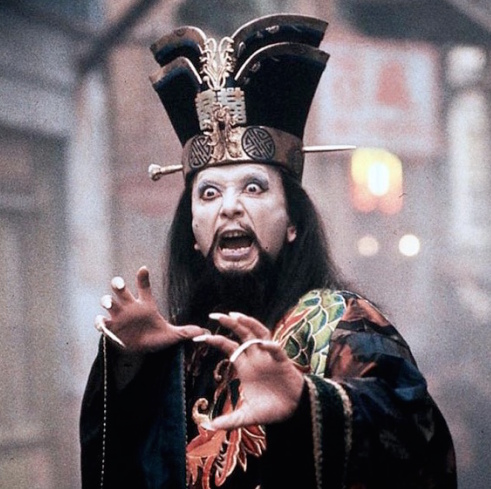 The entire supporting cast delivers — everybody pulls their weight and a few pounds over. I especially like Hong Kong martial arts star Carter Wong as Thunder, who looks habitually tense, building up to his hysterical death where he goes full Bob Clampett cartoon and balloons from rage until he explodes. (Nice practical VFX, too.) Kim Cattrall, who was Carpenter’s first choice for Gracie over studio objections, zips her way through the fast-patter dialogue. Ditto for Victor Wong as the magician/tour bus driver Egg Shen. He feels like a 1940s Warner Bros. contract player: whatever part you put him in that day, that part gets better.
The entire supporting cast delivers — everybody pulls their weight and a few pounds over. I especially like Hong Kong martial arts star Carter Wong as Thunder, who looks habitually tense, building up to his hysterical death where he goes full Bob Clampett cartoon and balloons from rage until he explodes. (Nice practical VFX, too.) Kim Cattrall, who was Carpenter’s first choice for Gracie over studio objections, zips her way through the fast-patter dialogue. Ditto for Victor Wong as the magician/tour bus driver Egg Shen. He feels like a 1940s Warner Bros. contract player: whatever part you put him in that day, that part gets better.
The standout is veteran Chinese-American actor James Hong, who was active in Hollywood since the 1950s. (He dubbed half the male voices for the 1956 Godzilla, King of the Monsters!) Known for playing small parts in classic movies like Chinatown and Blade Runner, Hong has the biggest and best role of his career here. In conception, Lo Pan reads like a Fu Manchu cliché with a supernatural slant, but Hong makes him both menacing and funny. Lo Pan’s decrepit wheelchair-bound physical form turns the scheming villain into a crotchety grandpa whose grandchildren have cruelly disappointed him. “This is the kind of thing that pisses me off to no end!” That’s an evil supervillain line. I could listen to James Hong recite this on a loop.
Once more, Carpenter celebrates his love for Golden Age director Howard Hawks with fast-talk exchanges and arch dialogue. There’s rarely a pause for breath in the chatter. Even the exposition roars past. Kate Burton’s reporter rattles off backstory as if she were filling in someone on the first three chapters of a Republic serial they missed. First-time viewers may feel bewildered at the blitz of info about the mystical history of Chinatown and its warring factions, but that’s okay — the main character doesn’t get it either.
Although John Carpenter is associated with action-heavy genres, he’s not truly an “action director.” He puts more emphasis on suspense sequence and shorter bursts of violence. But Big Trouble in Little China is the exception. It contains the best action scenes in any of his films, thanks to the martial arts choreography by James Lew and Carpenter indulging in crazy fantasy stunt work. (Remember, this was long before wire-work Kung Fu was mainstream in the U.S.) The movie doesn’t lean on standard gunfights and instead lets the fists and exotic weapons fly. The street brawl between the Chang Sing and Wing Kong and the later showdown in Lo Pan’s neon headquarters are the pinnacles of pure action in the Carpenter canon.
This was cinematographer Dean Cundey’s final production with Carpenter, and it’s the most classic look he ever achieved. It’s a crisp, sharp-looking picture with wonderful visual symmetry. Cundey lenses the immense sets by John J. Lloyd to give them an extra touch of artificiality, which is appropriate for the tone. You can feel the Hollywood studio system of yesteryear lurking in the background, and that enhances the characters, dialogue, and action. Comparing the look to an amusement park dark ride is a compliment.
The score from Carpenter and Alan Howarth is about par for their collaborations. But the end title song performed by the Coupe De Villes (Carpenter and his buddies Nick Castle and Tommy Lee Wallace) is a goofy but earnest synth-rock blast. In other words, the perfect theme song for the movie. And how could you say no to listening to the director of Halloween jamming with the director of The Last Starfighter and the director of Fright Night 2?
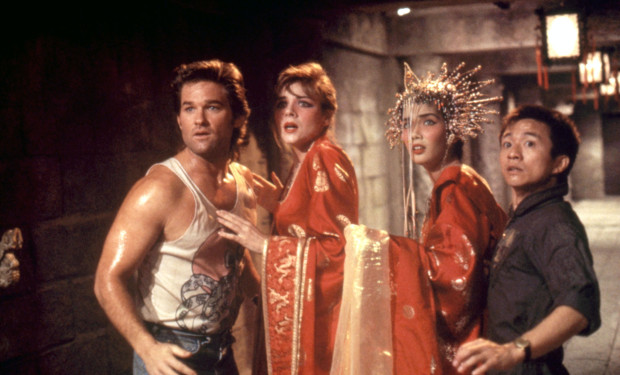 The Negatives
The Negatives
The cold opening was the idea of Fox CEO Barry Diller, who didn’t understand the film and specifically Jack Burton’s role in it. At Diller’s insistence, Carpenter shot a new opening scene of Egg Shen’s lawyer (Jerry Hardin) questioning the bus driver about what happened in Chinatown. Egg Shen makes sure his lawyer (and the audience) know ahead of time that Jack Burton was a hero who achieved something. Diller had a part in crafting the dialogue — and you can tell. It’s an unnecessary scene without the flair of the rest of the movie. It shows too early that Egg Shen is a wizard and draws attention to the Jack Burton joke before viewers have a chance to meet him. It also makes Egg Shen less interesting at the finale, since we know he’s not heading off to more adventures: he’s going to a lawyer’s office because there are real-world civic consequences for all this craziness. Boring.
This is the only time I’m going to say this about a John Carpenter film, but Big Trouble in Little China could benefit from being a bit longer. Arriving at just under a hundred minutes, an extra ten to twelve minutes to allow breathing space and give other characters comedy room might have improved it. I appreciate the crisp snap of the film, but I’d also enjoy extra time to hang with Egg Shen. Some more of grouchy old David Lo Pan and palling around between Jack and Wang. Bonus banter scenes of Gracie harping on Jack. Maybe an additional fight with the Three Storms. If we cut the pointless opening scene, we’d have even more time to play with. (Damn you, Barry Diller.)
The character who needs the extra attention the most is Miao Yin. She barely qualifies as a character. She’s a wax figurine who floats in Lo Pan’s headquarters or stands around as a blank-eyed zombie. Suzee Pai was cast to have otherworldly beauty, and she succeeds. But beating Lo Pan’s scheme is more important than actually rescuing Miao Yin, and there’s no established relationship with her and Wang Chi aside from what he tells Jack on the way to the airport. This flaw might have killed another film. The abundance of fantastic characters here makes it difficult to notice.
The Pessimistic Carpenter Ending
Mio Yin is rescued and Lo Pan defeated (by Jack Burton!). Jack gets back the Pork Chop Express and heads out on the road again — without even giving Gracie a goodbye kiss. But he’s picked up a monster stowaway in his truck that will probably kill him at the next stop when Jack forgets to click off the safety on his gun.
Next: Prince of Darkness
Ryan Harvey is one of the original bloggers for Black Gate, starting in 2008. He received the Writers of the Future Award for his short story “An Acolyte of Black Spires,” and his stories “The Sorrowless Thief” and “Stand at Dubun-Geb” are available in Black Gate online fiction. A further Ahn-Tarqa adventure, “Farewell to Tyrn”, is available as an e-book. His most recent publication, “The Invasion Will Be Alphabetized,” is now on sale in Stupendous Stories #19. Ryan lives in Costa Mesa, California where he works as a marketing writer. Occasionally, people ask him to talk about Edgar Rice Burroughs or Godzilla in interviews.
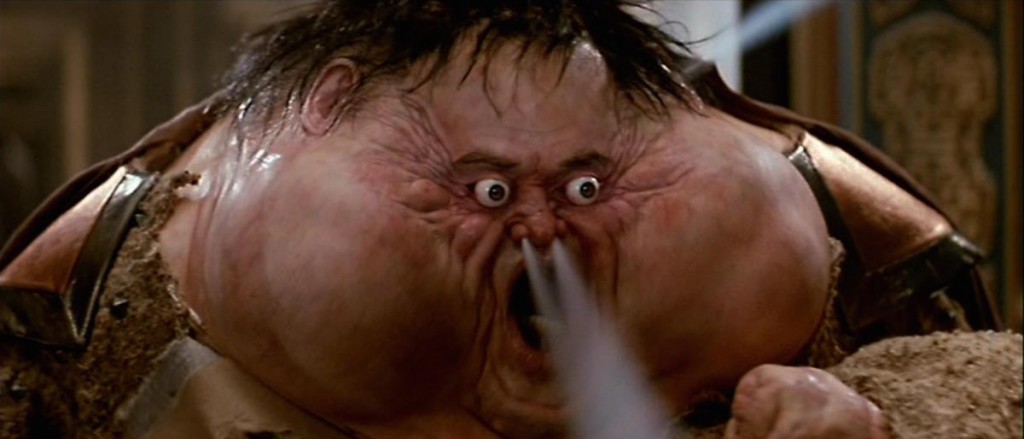
If I ever read a better article about this film I can’t recall it.
I love Big Trouble in Little China. For me it’s one of those ultra-rare movies that seem almost infinitely re-watchable.
And one of the joys of re-watching is recognizing the consistent craft of the dialogue, uttered so casually, and so often from someone utterly confused (Jack, of course), that it’s easy to miss how fitting, funny and revealing it actually is.
I’m reasonably certain I was one of the relatively small number of people who saw this in the theater back in 1986, although I don’t have any specific memories. Reading the article makes me think I should go rewatch it soon. And rewatch Zu: Warriors from the Magic Mountain, as long as I’m thinking of it.
It’s one of those movies – like Mystery Men – that came just a little bit too early. Two or three years later, it would have been a smash.
I’m on the Pork Chop Express, and have been since I saw it in the theater. As far as my own list of beloved films, it’s right up there, for all the reasons you so accurately nail in this review!
I have it on blu-ray (of course), and to fans I recommend listening to the audio commentary track with John Carpenter and Kurt Russell. I swear it’s like they forgot they were recording a commentary track (and for a film they’d done like two decades earlier, so a lot of stuff about making it they’d forgotten anyway) and just fall into casual friendly banter. It’s like you’re hanging out having a beer with Kurt and John. 🙂
God I love this film. I think tomorrow I’m going to call a Family Movie Night and introduce it to my kids.
Easily my most favorite Carpenter film and one of my best films of all time. I can rewatch this anytime. I never knew all this about its production! And I never considered giving it a cultural reading. Thank you!
Kurt Russell is always great on commentary tracks. The one he did with Robert Zemeckis for Used Cars is a hoot. (Forget Snake Plisskin, by the way – Rudy Russo is Kurt’s greatest role.)
The commentary, which was recorded for the first DVD release, is definitely a great time of two old buddies catching up. At the end, Carpenter says, “Sorry we didn’t talk about the movie more.” Some of my favorite parts are Russell going over how rough his early post-Disney career was when “anything I was in meant the film didn’t make money.” Then Carpenter will ask, “Well, what about …” and Russell will explain, “Nope, didn’t do well.” It’s interesting that Russell believes it wasn’t until Tequila Sunrise that Hollywood started to see him as an actor who could open a movie.
Thank you, Mr. Harvey, for giving a great film its just due. This is one of my favorite films, for the reasons that you have listed, and IMO one of the most fun movies ever made. Endlessly rewatchable.
Now, about that marketing campaign…when this film came out, I first heard about it in a college town, small place where all the movie theaters were owned by the same family. There were separate theaters for different types of movies, and every movie got at least a week’s advertising in the college paper before opening on Monday. All movies played for a minimum of 1 week. This movie opened in the grindhouse, a place called the Flick. We drove past the place on Sunday to meet some friends, and spent the day catching up. Late in the afternoon, a buddy stops by and says that he had seen the greatest movie ever the night before. It had everything: action, magic, monsters, girls, you name it. What was the title? Big Trouble in Little China??? We pelted him with food, napkins and verbal abuse. If it was so good, how come none of us ever heard of it? He said we had to see it, so we looked it up in the paper and saw it had a 5:00 showing. It was 4:45, so we beat feet down the alley, down six blocks to the main drag, turned the corner and…
The movie theater was GONE. They had torn it down that afternoon; then we did a slow turn to stare at the guy who told us about it and he almost had a stroke.
Someone had it in for this movie: they refused to advertise it, they only let it run for six days and when the run was over, they tore down the theater it was playing in. Well, the joke was on them; when this film became available for rent, it played in the dorm room theaters on campus at least once a month for more than 10 years, every viewing to a packed house.
John Carpenter is a twisted genius.
This is my favorite film of all time, I saw it at the time and it’s only film I watched three times in the same day. “You are not put upon this earth to ‘get it’, Mr. Jack Burton.
FACTOID: Noel Toy, who plays Mrs. O’Toole in the White Tiger club, was a famous fan dancer whose fame approached that of contemporary nudist Sally Rand, and she was also married to the actor who played Jack in Reefer Madness, Carelton Young.
I loved this movie as a kid and I loved it again when I watched it for the second time a year or so ago. So many great lines!